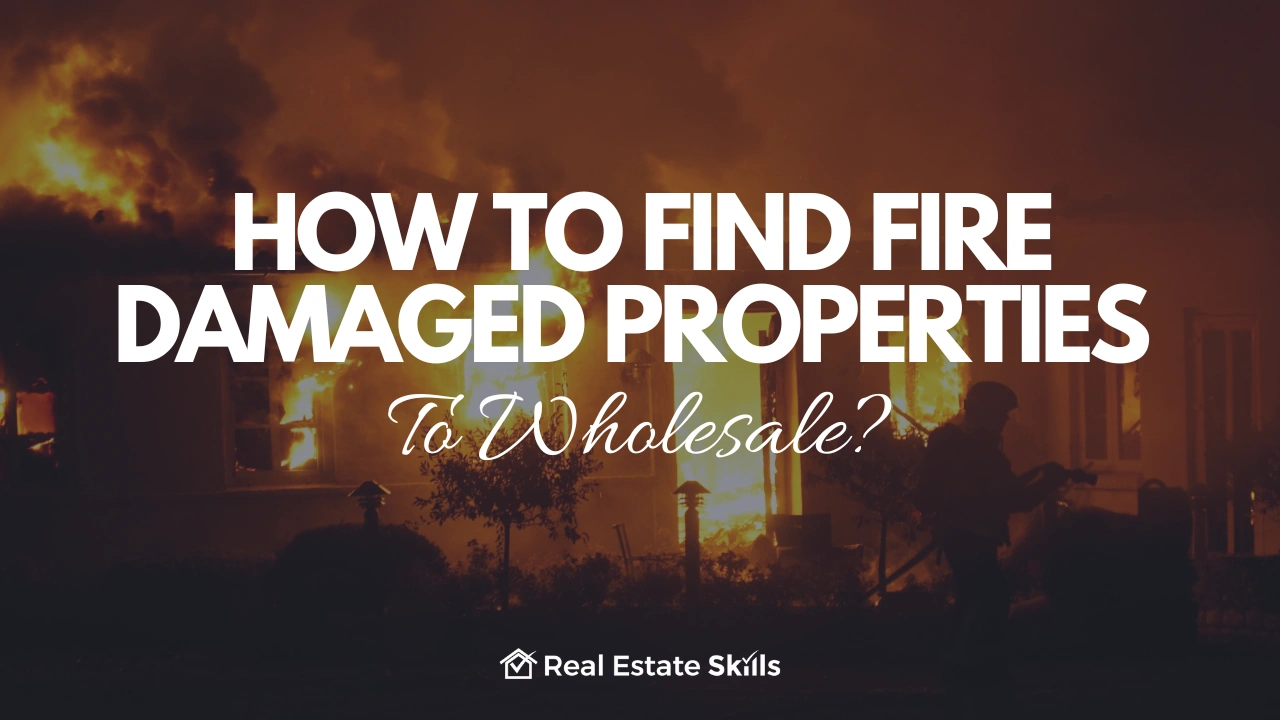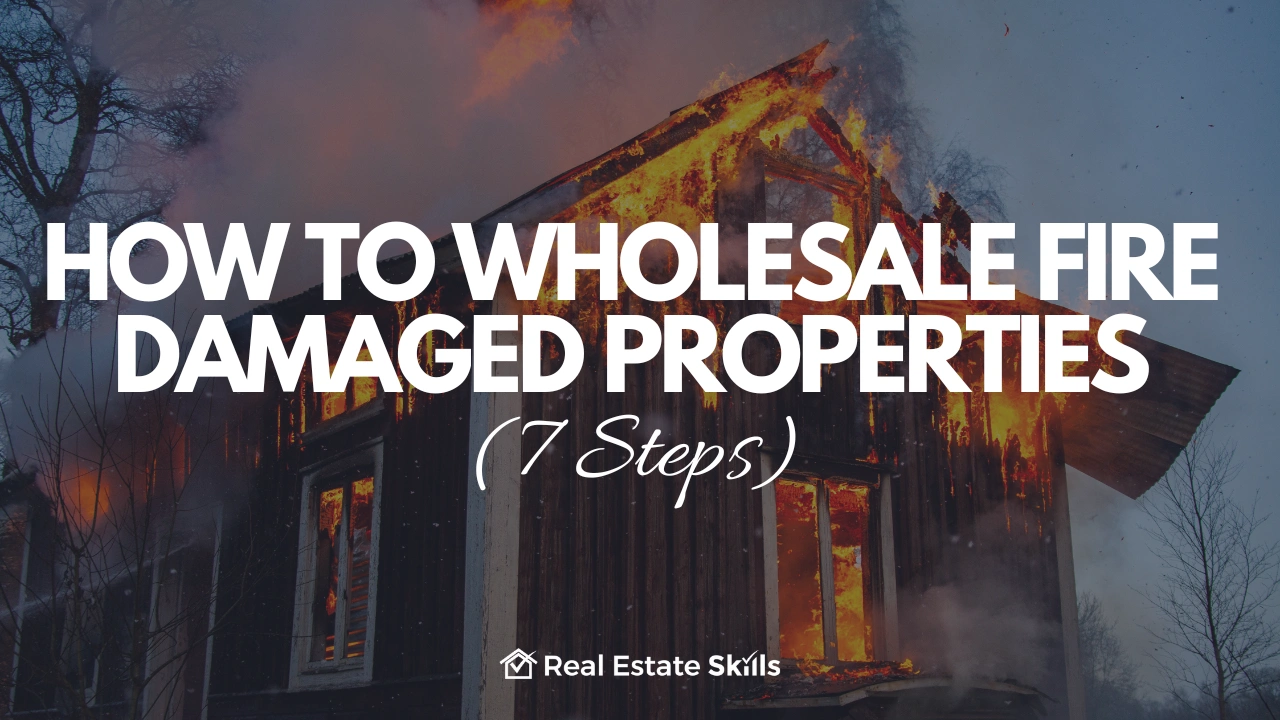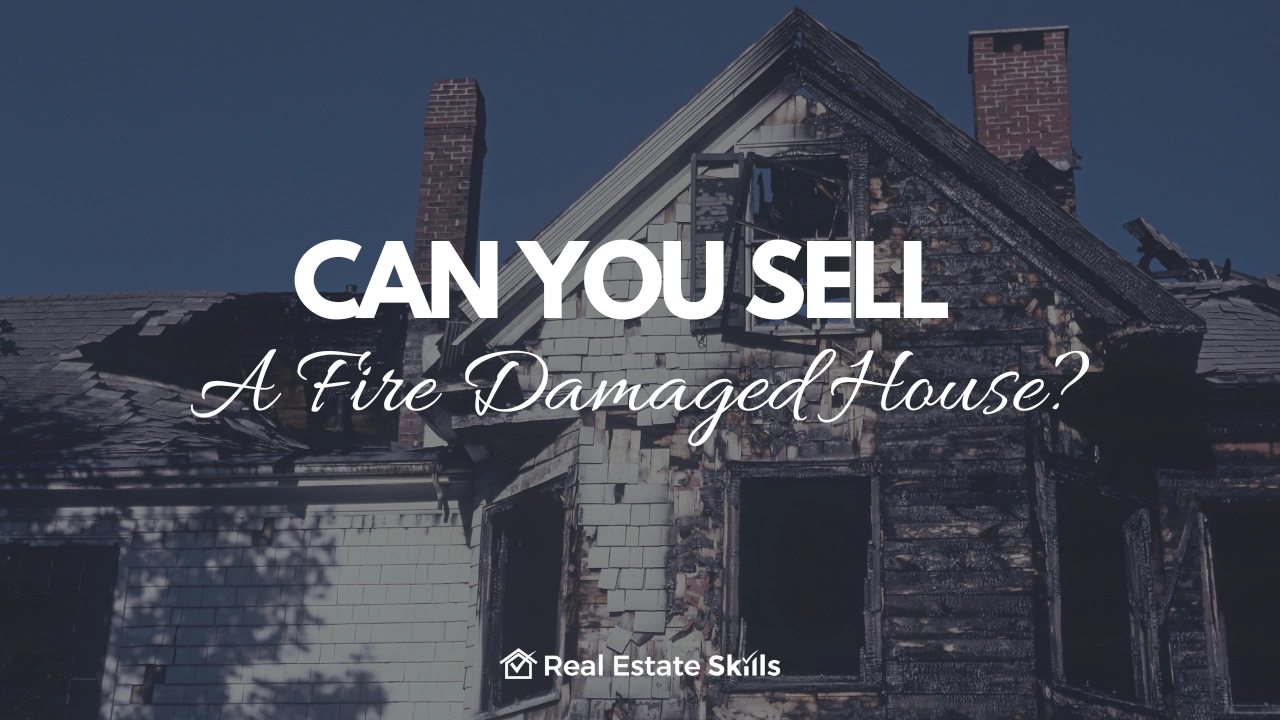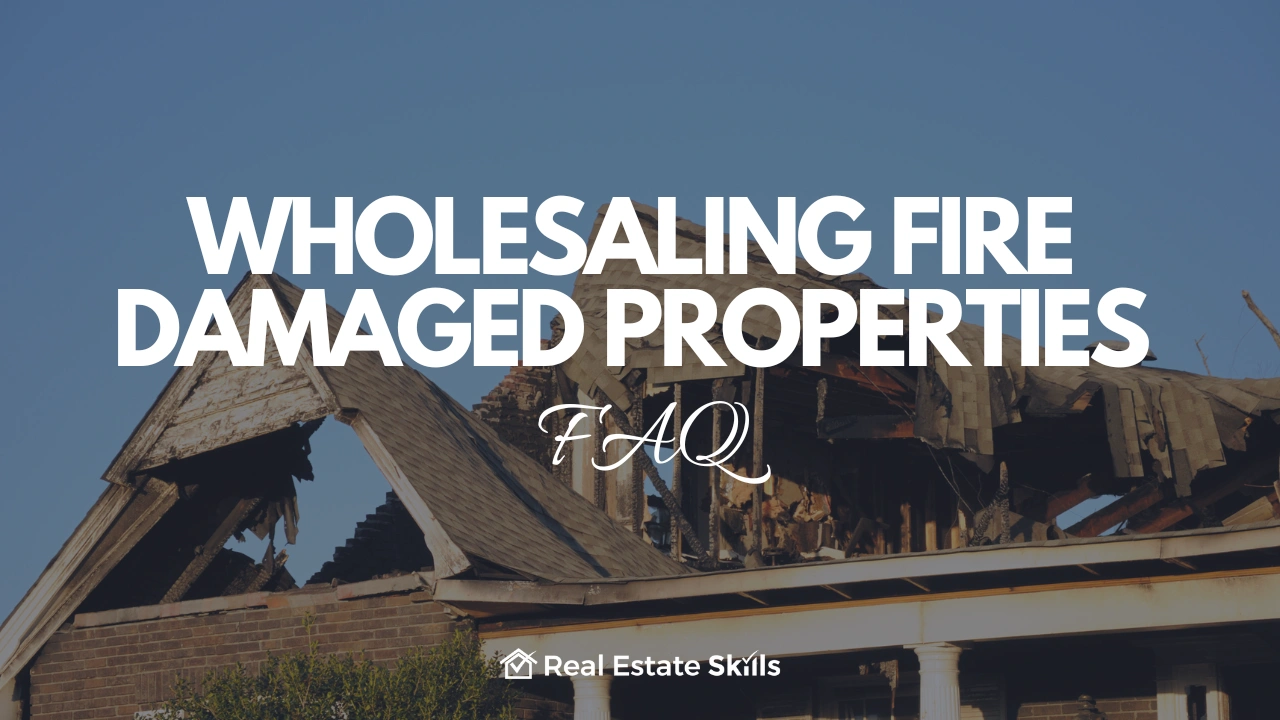
Wholesaling Fire Damaged Houses: The (ULTIMATE) Guide
Oct 15, 2025
While fire-damaged houses may not be as abundant as other distressed properties, these potential wholesale houses often have the advantage of consistently motivated sellers. The key to turning these fire-damaged homes into hot deals lies in knowing how to locate them.
Another advantage to wholesaling fire-damaged houses is not as many wholesalers are focused on them. Putting a system into place that helps you get motivated sellers of fire-damaged homes into a contract can help you grow your real estate business.
- What Is Wholesaling?
- What Is Wholesaling Fire Damaged Houses?
- How To Find Fire Damaged Properties To Wholesale?
- How To Wholesale Fire Damaged Properties
- Can You Sell A Fire Damaged House?
- How To Sell A Fire Damaged House?
- How To Price A Fire Damaged House?
- Rehabbing A Fire Damaged House: 3 Tips
- Wholesaling Fire Damaged Properties FAQ
- Final Thoughts
If you’re serious about doing your first real estate deal, don’t waste time guessing what works. Our FREE Training walks you through how to consistently find deals, flip houses, and build passive income—without expensive marketing or trial and error.
This FREE Training gives you the same system our students use to start fast and scale smart. Watch it today—so you can stop wondering and start closing.
What Is Wholesaling?
Wholesaling is a type of real estate investment strategy that’s widely considered one of the best short-term investment strategies. It appeals to new investors because of the low upstart costs.
The wholesaler gets a property under contract, but before closing and taking possession, they assign their rights to purchase the property to a second investor.
The wholesaler earns an assignment fee from the end buyer, who goes on to close on the property. If the wholesaler is a licensed real estate agent, a commission may be earned in addition to the wholesale fee. Often, the transaction closes quickly with minimal contingencies since it involves a cash offer.
Since the wholesaler doesn’t typically close on the property, little capital is necessary to get started in wholesaling. There are a few situations where the wholesaler may find themselves needing to close on the house and then sell almost immediately to the end buyer. This is known as a double close. In such cases, the wholesaler can use a hard money loan or transactional funding to meet the purchase obligation.
What Is Wholesaling Fire Damaged Houses?
A fire-damaged property is just as its name suggests—a property has caught on fire and burned. In most cases, the house has sustained severe damage and needs to be gutted and rebuilt from the ground up.
The owner is typically very motivated to sell. They have received their insurance check and often moved on to a new residence.
However, they are still responsible for the land and burned structure that remains.
Fire-damaged houses represent some of the best opportunities for wholesalers because there is less competition from other wholesalers and because the sellers are typically very motivated.

How To Find Fire Damaged Properties To Wholesale
It can be a challenge to find homes to wholesale. Narrowing your search to a specific type of home can make that even more challenging. The good news is, that there are a few steps you can take to reach those motivated sellers looking to get rid of their fire-damaged properties.
Here are three sources for finding fire-damaged properties:
Local Fire Department
Contact the local fire department and ask for a list of properties that have been fire damaged. This is public information.
In addition to contacting the fire department directly, you can also check out the fire department’s social media pages. Departments often post photos of residential fires with a general mention of where the fire took place so you can figure out the property's location.
You might also consider adding a firefighter to your professional network.
Insurance Company
It is to your advantage to nurture a network of insurance agents and adjusters. These folks are often the first to be called after emergency responders.
Begin to build your network and let these professionals know you are interested in wholesaling fire-damaged properties. The goal will be for them to provide homeowners with your contact information.
Real Estate Professionals
If you are well-networked with real estate agents and brokers, they are another great source for fire-damaged properties. A lot of people will call a real estate agent when they have a fire-damaged property. You should always plan to pay your realtor a percentage of your fee.
In addition to the above three ways to get leads on fire-damaged properties, you can also run online ads using the keyword phrase, “How to sell a fire-damaged property.”
You can also watch the local news to get your leads. Other sources include your local MLS or Zillow, as well as lists of foreclosures.

How To Wholesale Fire Damaged Properties (7 Steps)
The steps to wholesale fire-damaged property look very much like the steps for wholesaling any non-auction property. Here is a step-by-step process for wholesaling fire-damaged properties:
- Step 1 - Build A Cash Buyers List
- Step 2 - Find Motivated Seller Leads
- Step 3 - Determine Rehab Costs & Property Value
- Step 4 - Determine The ARV & Purchase Price
- Step 5 - Put Property Under Contract
- Step 6 - Assign The Contract
- Step 7 - Close The Deal & Get Paid
Step 1 - Build A Cash Buyers List
Just as with any wholesale deal, it’s always a best practice to build a list of potential cash buyers prior to going under contract. This ensures you have a ready list of potential end buyers for assigning the contract. Once under contract, the window isn’t typically long enough to build a relationship with a cash buyer before closing.
If you don’t have a list of cash buyers and haven’t worked those relationships, you risk having to go through with the purchase by working with a hard money lender. It’s all about the speed of the deal.
Check out this quick video that talks about how you can find cash buyers for free!
Step 2 - Find Motivated Sellers With Fire-damaged Property
You can find the owner of the fire-damaged property by getting leads from the fire department, media, insurance professionals, or other sources. Contact the owner by cold calling or SMS text. If you are a subscriber, you can use skip tracing to get their contact information.
While it is usually advantageous to contact the owner as soon as possible, be aware of their emotional state. Loss of property by fire is not only the loss of a home but often, much of their personal belongings. There may have been injuries or the loss of a beloved pet. The house may even be in probate and the owners will likely feel overwhelmed and emotional. Be their solution.
Step 3 - Determine Costs And Value Of Lot
This is when you do your due diligence. You will want to determine the costs involved in clearing the lot and readying it for new construction in order to understand what an investor might pay for it. The cost for preparing a lot can vary greatly, typically between $5,000 and $25,000. This includes tearing down in addition to clearing the lot. The size of the burned structure, as well as lot size, will impact the cost.
In some cases, the damage may be confined to a single room, so you may want to consider only the cost of removing the damage and mitigating smoke and water damage in the salvageable portion of the structure.
Once you’ve come up with an estimate of the expected cost for an investor to clear the land, assess the value of the bare lot based on comparable property values within the same market.
Step 4 - Estimate The Investor Price And ARV
After learning the cost of clearing the lot, it’s time to figure out the after-repair value or ARV so that you can get a handle on what a cash buyer is likely to pay. You can calculate the cost of building a new residence on the lot based on the average cost per square foot for new construction in your market and the typical size of a residence.
Once you’ve estimated the new construction costs, add this to the cost of clearing the land that you’ve calculated in the previous step. Combined, this cost will help you understand what the real estate investor is considering if planning to flip the property.
Step 5 - Put Fire-Damaged Property Under Contract
Your next step is to get the property under contract for the lowest possible price. Begin formulating your offer based on what the land is worth, then discount that price heavily due to the cost of clearing the debris.
Make sure to factor in your assignment fee when running the numbers and agreeing on a purchase price.
Step 6 - Assign The Contract To A Cash Buyer
Once you are under contract with the fire-damaged property owner, it’s time to assign the contract to one of the cash buyers from your network of real estate investors.
These investors are likely to consist of flippers or those planning to hold the property after rehab for rental. Be sure your wholesale fee is spelled out in the assignment contract.
Step 7 - Close And Get Paid
Once you’ve identified an end buyer for the property and entered an assignment contract, it’s time to close the deal and receive your assignment fee. Work with the title company to ensure all parties are on track and be a facilitator of the deal.
Congratulations on wholesaling a fire-damaged property! Now it’s time to rinse and repeat.
Read Also: Wholesaling Real Estate For Beginners
Can You Sell A Fire Damaged House?
Yes, the owner of a fire-damaged house can sell the property in one of two ways. They can either sell it “as is,” meaning no clearing of the burned structure prior to the sale, or they can repair the fire-damaged structure and then sell.
Typically, owners most likely to sell a fire-damaged house “as is” are those receiving a substantial fire insurance payout and also a lot of equity in their home so they can pay off their mortgage and still have enough to start anew. Wholesale real estate relies on these motivated sellers.
Read Also: Finding Motivated Seller Leads: Free & Paid Tactics
How To Sell A Fire Damaged House?
The first rule in selling a fire-damaged house is never to attempt to cover up any damage. Obtain copies of any relevant documents related to the fire so you can answer the buyer’s questions with documented answers.
This information includes such things as insurance claims, emergency response reports, and any repairs or changes that have been made in the structure since the fire.
How To Price A Fire Damaged House?
In pricing a fire-damaged house, there are two considerations. One, what is the cost to clear the burned structure and related debris from the lot? Two, what is the market value of the bare lot?
You can get estimates for the cost of clearing the property. The market value of the land can be determined by analyzing the value of recent sales of comparable properties.
If the structure is salvageable, you’ll want to consult with a general contractor and structural engineer to determine what the cost of repairing the house will be. Then, utilize the MAO Formula to arrive at your desired purchase price.
Rehabbing A Fire Damaged House: 3 Tips
While your primary focus may be wholesaling, there may be opportunities to rehab a fire-damaged property and then sell it, much like any other real estate flip. Even if you are planning to wholesale the home, it is useful to have an idea of what an investor will need to consider in making you an offer to go under an assignment contract.
Repairing a fire-damaged home means not only addressing fire damage but also looking into damages by smoke, soot, and water as well. It’s important to realize rehabbing can get very expensive, very quickly. Here are three tips for rehabbing a fire-damaged house to keep in mind if you are flipping houses.
Tip 1 - Address Structural Issues First
While ultimately the damage by smoke, soot, and water may cost more to mitigate, it’s wise to address the property’s structural issues first to ensure structural integrity. An experienced contractor will address things like replacing damaged trusses and floor joists, as well as securing the home’s interior framework.
Tip 2 - Get The Electrical System Inspected
The electrical system of a fire-damaged home should be inspected by a licensed electrician who is able to make any necessary repairs. Common electrical issues with fire-damaged properties include issues with wiring, fixtures, and outlet. Often, the property’s breaker box will need replacing as well.
Tip 3 - Focus On One Room At A Time
You can expect the rehab project to take several months in most cases. Once the home’s structural integrity is assured, and the electrical system inspected and restored, the best way to address the rest of the rehab project is to focus on one room at a time.
Drywall replacement or restoration, as well as restoring floors, are common issues that will need to be addressed, whether due to fire, water or smoke damage. Restoration experts recommend tackling this state of the project room by room.
Read Also: Estimating Rehab Costs: (Ultimate) Investor's Guide
Wholesaling Fire Damaged Properties FAQ
Wholesaling fire-damaged properties can be a lucrative component of your wholesaling business. There is less competition than with other distressed properties, though admittedly, there can also be a smaller pool of end buyers. It can be difficult to decide whether wholesaling fire-damaged properties should be developed as a component of your wholesaling operation.
The following questions and answers can help you decide what’s best for your real estate business.
Does A House Lose Value After A Fire?
A fire-damaged house is worth less than a comparable property that has not sustained fire, smoke, or water damage. When selling a home “as is” after a fire, factors that impact the amount of discount are the anticipated cost of clearing the land of debris, the cost of making the necessary repairs, and the value of the land.
Do Fire-damaged Homes Make Good Investment Properties?
Entrepreneurs looking to add properties to their real estate business may find fire-damaged homes to be a good option. One of the advantages of focusing on fire-damaged properties as part of your investment portfolio is you are likely to face less competition from other investors. You can expect to purchase the property at a significant discount.
Homes that have been professionally restored can be considered a good investment property, whether you decide to flip the home, use it as a rental property, or wholesale it. The key is to understand your after-repair value and your costs of rehab so you can make an informed decision on your maximum purchase price. There is the bonus of potentially helping a homeowner at a very stressful time in their lives.
Should I Buy A Fire-damaged House To Wholesale?
Finding a distressed property to get under contract at a discount can be a challenge, especially for beginners. There is only so much inventory when it comes to distressed homes. Opening your search to include fire-damaged properties will increase the number of potential properties to get under contract. You’re also likely to face less competition from other wholesalers.
The downside is that not all end buyers are interested in fire-damaged properties, so you may face more challenges in assigning a contract if your goal is to wholesale the property. You can mitigate this by following the best practice of lining up your network of cash buyers prior to going under contract on a property.
Should I Sell My House After A Fire?
Your decision on whether to sell a house after a fire is dependent on your financial situation. If you have sufficient equity in your home, you can pay off your mortgage with your insurance payout and still have money left for getting a fresh start, it may be the best option.
Every situation is unique, but you will need to decide whether it makes more financial sense to sell the property “as is” or rehab your home prior to sale. Factors entering the equation include the amount of any remaining mortgage, the amount of insurance payout, and the market value of the lot.
If you do any repairs on the property, keep the related documentation to present to the seller as verification of the work completed. Keep in mind your pool of home buyers will be smaller than with an undamaged property.
Final Thoughts
Fire-damaged properties can be an excellent source of distressed homes for real estate wholesaling. They can be purchased at a significant discount to market value. As such, there is the opportunity to earn significant fees when assigned to an end buyer.
Potential downsides include the possibility of fewer cash buyers for assigning the contract and lower offers by investors to buy fire-damaged properties.
There are several sources for finding motivated sellers, including fire stations, insurance agents, real estate professionals, traditional media, and social media.
Because homeowners are going through a stressful time in their lives, proceed with care when contacting a potential seller. Be ready to calculate the costs of clearing the land and the after-repairs value of the property so you understand what an investor is likely to offer.
If you’re serious about doing your first real estate deal, don’t waste time guessing what works. Our FREE Training walks you through how to consistently find deals, flip houses, and build passive income—without expensive marketing or trial and error.
This FREE Training gives you the same system our students use to start fast and scale smart. Watch it today—so you can stop wondering and start closing.
*Disclosure: Real Estate Skills is not a law firm, and the information contained here does not constitute legal advice. You should consult with an attorney before making any legal conclusions. The information presented here is educational in nature. All investments involve risks, and the past performance of an investment, industry, sector, and/or market does not guarantee future returns or results. Investors are responsible for any investment decision they make. Such decisions should be based on an evaluation of their financial situation, investment objectives, risk tolerance, and liquidity needs.








